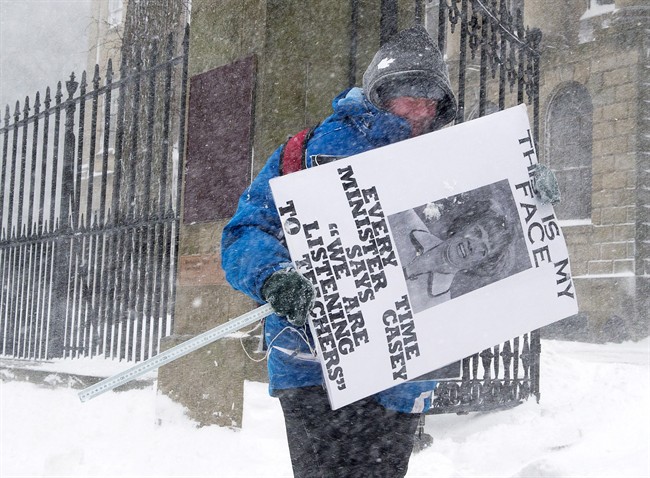On Tuesday, the governing Liberals plan to introduce a bill that will impose a contract on Nova Scotia’s public school teachers.

Premier Stephen McNeil announced Saturday that his government would impose a contract on teachers after they rejected the last three tentative agreements. Initially the government planned to introduce the bill Monday evening but it was postponed due to the winter wallop that hit Atlantic Canada.
McNeil was not available for an interview on Monday, and the government has not revealed whether it will impose a contract that was previously rejected or create a new one. The province’s 9,300 public school teachers have been working-to-rule since December, after they rejected the second tentative agreement.
READ MORE: NS teachers, students, opposition MLAs concerned about back-to-work legislation
Teachers rejected the third tentative agreement last week. The Nova Scotia Teachers Union executive recommended teachers accept each of the contracts that teachers ultimately rejected.
Imposing a contract will likely take several days
Both the Progressive Conservatives and the NDP have promised to oppose the bill, so it’s expected to take several days for the bill to pass.
Opposition parties can use various procedural tricks to slow the legislative process. When the government introduced Bill 148 in December 2015, the Liberals tried to combat opposition delays by forcing 12:01 a.m. sittings in an effort to finish each stage of debate within one calendar day.
With more messy weather expected Wednesday, it’s difficult to say when the teachers’ contract will pass. In the case of Bill 148, it took five days for the bill to be proclaimed.
Here’s a look at the process that would make a proposed teachers contract law:
- Introduction: The bill will likely be introduced on Tuesday once the legislature resumes at 8 p.m. MLAs can’t start debating the bill until the following day, but question period is still expected to happen.
- Second reading: The legislature will most likely resume at 12:01 a.m. on Wednesday. Before debate on the contract can start, the house will likely go through routine proceedings, question period, and opposition day debate — all of that could take up to four hours. Then the second reading would start. Each MLA can speak for up to an hour, and with 17 opposition MLAs that could take some time. Other procedural tricks like motions to delay debate and calling for a recorded vote, could further extend second reading. If it isn’t done in one calendar day then it would continue into the next day.
- Law Amendments Committee: Every Nova Scotian is allowed to present to the committee on the bill. The committee can start directly after second reading ends. During the Bill 148 debate, the committee sat for three days, hearing from witnesses on Tuesday evening, all day Wednesday, and Thursday morning.
- Committee of the whole house: Committee of the whole house can start directly following law amendments. Every clause of the bill can be debated, and MLAs can speak for up to an hour on each clause. Motions to amend the bill and other delay tactics can also extend debate in this stage.
- Third reading: The final debate on the bill has to start the day after committee of the whole. At this stage, the debate process is very similar to second reading. After a final vote from MLAs, the lieutenant governor would proclaim the bill.
- ‘Shock and disbelief’ after Manitoba school trustee’s Indigenous comments
- Invasive strep: ‘Don’t wait’ to seek care, N.S. woman warns on long road to recovery
- Norad looking to NATO to help detect threats over the Arctic, chief says
- ‘Super lice’ are becoming more resistant to chemical shampoos. What to use instead


Comments